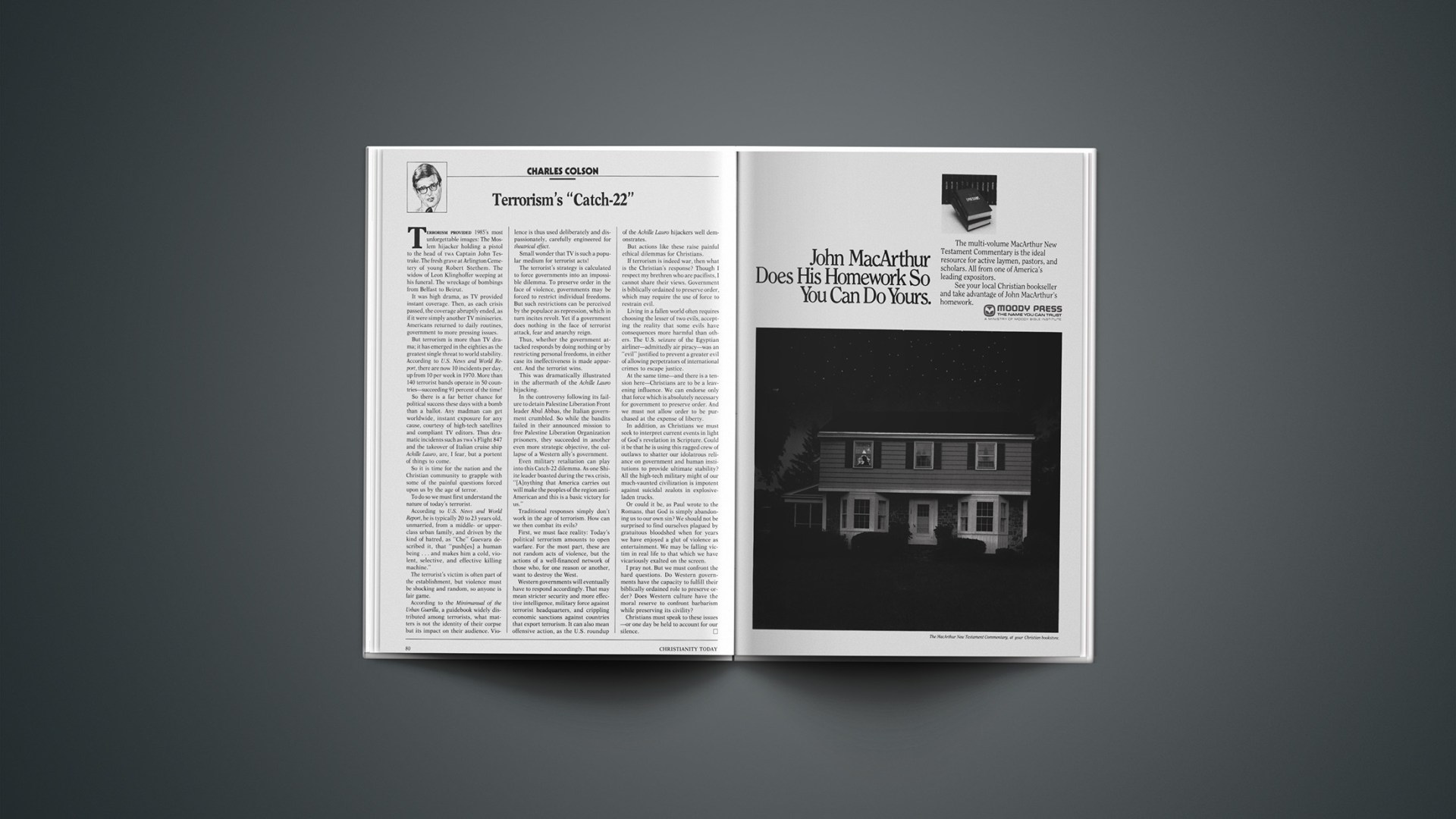Terrorism provided 1985’s most unforgettable images: The Moslem hijacker holding a pistol to the head of TWA Captain John Testrake. The fresh grave at Arlington Cemetery of young Robert Stethem. The widow of Leon Klinghoffer weeping at his funeral. The wreckage of bombings from Belfast to Beirut.
It was high drama, as TV provided instant coverage. Then, as each crisis passed, the coverage abruptly ended, as if it were simply another TV miniseries. Americans returned to daily routines, government to more pressing issues.
But terrorism is more than TV drama; it has emerged in the eighties as the greatest single threat to world stability. According to U.S. News and World Report, there are now 10 incidents per day, up from 10 per week in 1970. More than 140 terrorist bands operate in 50 countries—succeeding 91 percent of the time!
So there is a far better chance for political success these days with a bomb than a ballot. Any madman can get worldwide, instant exposure for any cause, courtesy of high-tech satellites and compliant TV editors. Thus dramatic incidents such as TWA’s Flight 847 and the takeover of Italian cruise ship Achille Lauro, are, I fear, but a portent of things to come.
So it is time for the nation and the Christian community to grapple with some of the painful questions forced upon us by the age of terror.
To do so we must first understand the nature of today’s terrorist.
According to U.S. News and World Report, he is typically 20 to 23 years old, unmarried, from a middle-or upper-class urban family, and driven by the kind of hatred, as “Che” Guevara described it, that “push[es] a human being … and makes him a cold, violent, selective, and effective killing machine.”
The terrorist’s victim is often part of the establishment, but violence must be shocking and random, so anyone is fair game.
According to the Minimanual of the Urban Guerilla, a guidebook widely distributed among terrorists, what matters is not the identity of their corpse but its impact on their audience. Violence is thus used deliberately and dispassionately, carefully engineered for theatrical effect.
Small wonder that TV is such a popular medium for terrorist acts!
The terrorist’s strategy is calculated to force governments into an impossible dilemma. To preserve order in the face of violence, governments may be forced to restrict individual freedoms. But such restrictions can be perceived by the populace as repression, which in turn incites revolt. Yet if a government does nothing in the face of terrorist attack, fear and anarchy reign.
Thus, whether the government attacked responds by doing nothing or by restricting personal freedoms, in either case its ineffectiveness is made apparent. And the terrorist wins.
This was dramatically illustrated in the aftermath of the Achille Lauro hijacking.
In the controversy following its failure to detain Palestine Liberation Front leader Abul Abbas, the Italian government crumbled. So while the bandits failed in their announced mission to free Palestine Liberation Organization prisoners, they succeeded in another even more strategic objective, the collapse of a Western ally’s government.
Even military retaliation can play into this Catch-22 dilemma. As one Shiite leader boasted during the TWA crisis, “[A]nything that America carries out will make the peoples of the region anti-American and this is a basic victory for us.”
Traditional responses simply don’t work in the age of terrorism. How can we then combat its evils?
First, we must face reality: Today’s political terrorism amounts to open warfare. For the most part, these are not random acts of violence, but the actions of a well-financed network of those who, for one reason or another, want to destroy the West.
Western governments will eventually have to respond accordingly. That may mean stricter security and more effective intelligence, military force against terrorist headquarters, and crippling economic sanctions against countries that export terrorism. It can also mean offensive action, as the U.S. roundup of the Achille Lauro hijackers well demonstrates.
But actions like these raise painful ethical dilemmas for Christians.
If terrorism is indeed war, then what is the Christian’s response? Though I respect my brethren who are pacifists, I cannot share their views. Government is biblically ordained to preserve order, which may require the use of force to restrain evil.
Living in a fallen world often requires choosing the lesser of two evils, accepting the reality that some evils have consequences more harmful than others. The U.S. seizure of the Egyptian airliner—admittedly air piracy—was an “evil” justified to prevent a greater evil of allowing perpetrators of international crimes to escape justice.
At the same time—and there is a tension here—Christians are to be a leavening influence. We can endorse only that force which is absolutely necessary for government to preserve order. And we must not allow order to be purchased at the expense of liberty.
In addition, as Christians we must seek to interpret current events in light of God’s revelation in Scripture. Could it be that he is using this ragged crew of outlaws to shatter our idolatrous reliance on government and human institutions to provide ultimate stability? All the high-tech military might of our much-vaunted civilization is impotent against suicidal zealots in explosive-laden trucks.
Or could it be, as Paul wrote to the Romans, that God is simply abandoning us to our own sin? We should not be surprised to find ourselves plagued by gratuitous bloodshed when for years we have enjoyed a glut of violence as entertainment. We may be falling victim in real life to that which we have vicariously exalted on the screen.
I pray not. But we must confront the hard questions. Do Western governments have the capacity to fulfill their biblically ordained role to preserve order? Does Western culture have the moral reserve to confront barbarism while preserving its civility?
Christians must speak to these issues—or one day be held to account for our silence.










